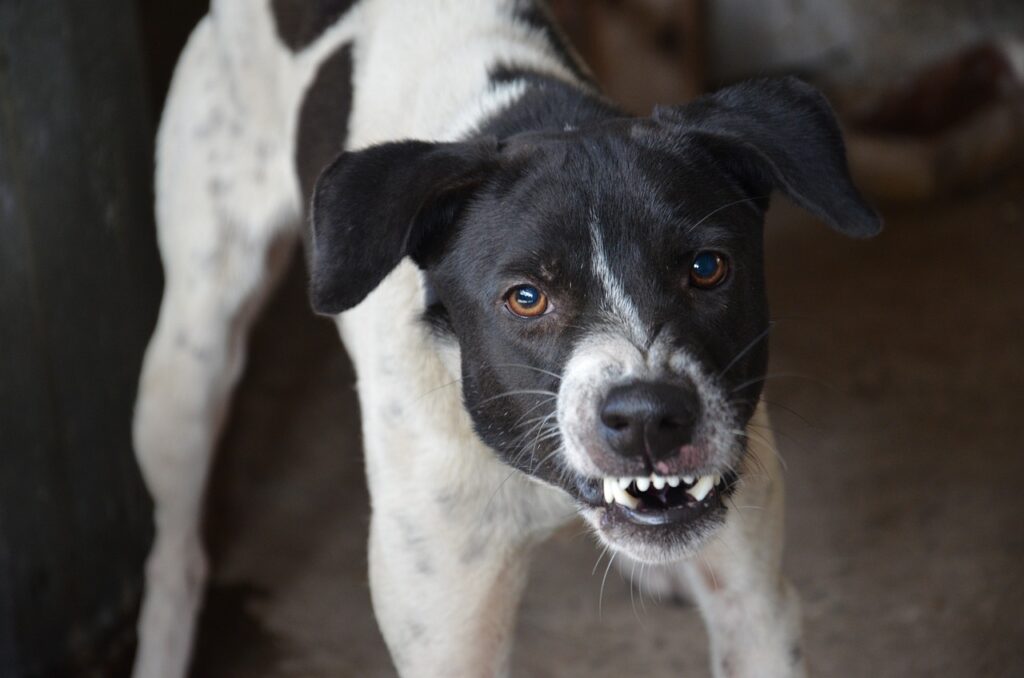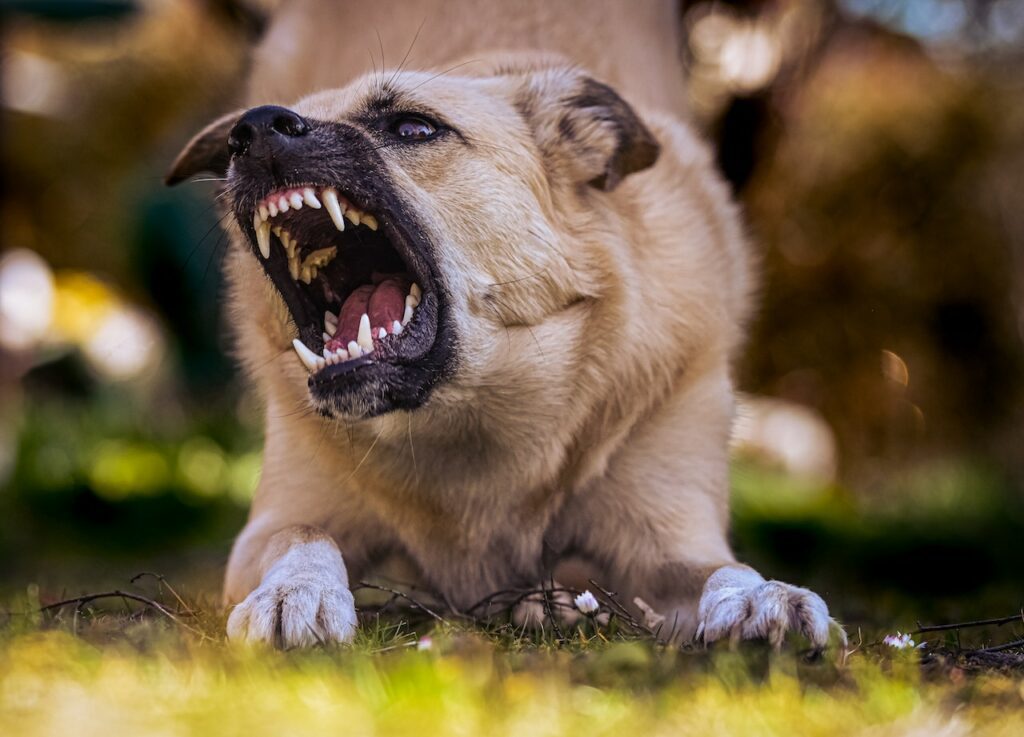While it’s reassuring to know that rabies vaccines are highly effective in protecting dogs from this deadly disease, no vaccine is 100% foolproof.
This guide explores this uncommon scenario, providing a comprehensive understanding of the effectiveness of rabies vaccinations, the slight risks involved, and how to ensure your beloved canine companion’s continued health and safety.
- What Is Rabies In Dogs
- Can Vaccinated Dog Cause Rabies?
- How Effective Is Dog Rabies Vaccine?
- Can a Vaccinated Dog Give You Rabies From a Scratch?
- Chances Of Getting Rabies From a Dog Bite
- Do You Have To Take Vaccination Against Rabies If a Vaccinated Dog Bites You?
- Can Vaccinated Dog Get Rabies?
- Can a Healthy Dog Transmit Rabies?
- In Conclusion
What Is Rabies In Dogs

Rabies is a deadly viral infection that affects the central nervous system of mammals, including dogs. The virus is typically transmitted through the bite of an infected animal and can be passed to humans as well as other animals.
The rabies virus specifically targets the brain and spinal cord, leading to severe neurological complications.
Symptoms in dogs often begin with noticeable changes in behavior. A normally docile dog might become aggressive, while an active dog might seem unusually lethargic.
As the disease progresses, more specific symptoms appear. These include fever, vomiting, anorexia, excessive drooling, difficulty swallowing, and signs of cerebral dysfunction.
Some dogs may display a depraved appetite, eating non-food items like stones or earth. An infected dog might also have a staggering gait and show avoidance of water or difficulty drinking.
Can Vaccinated Dog Cause Rabies?

Yes. While it’s highly unlikely, there is a small chance that a vaccinated dog could contract and transmit rabies.
Vaccines are highly effective in preventing the disease, but they do not offer 100% protection. In rare instances, a vaccinated dog might still contract the virus.
However, the risk of a vaccinated dog getting rabies and passing it on is extremely low.
It’s important to ensure that your pet’s vaccinations are always up-to-date to provide the best possible protection against the disease.
How Effective Is Dog Rabies Vaccine?
One study found that only 4.9% of cases of rabid dogs had a history of prior rabies vaccination. The rabies vaccine for dogs is highly effective but no vaccine is 100% foolproof.
The vaccine is extremely successful at protecting dogs against infection.
In fact, some studies indicate that if the vaccine is administered promptly and properly to a dog exposed to a rabid animal, it is nearly 100 percent effective.
Different studies have shown effectiveness rates varying from around 85% to as high as 96.9%, depending on various factors such as vaccine handling and the individual dog’s response.
Therefore, while there’s a small chance of the vaccine not providing complete protection, its effectiveness is generally very high.
Can a Vaccinated Dog Give You Rabies From a Scratch?
Yes. There is a small chance that a vaccinated dog could transmit rabies through a scratch.
Rabies is typically transmitted through the saliva of an infected animal via bites.
However, it can also be spread if the saliva comes into contact with a fresh scratch or wound.
If a vaccinated dog was to be infected with rabies, which is rare, there’s a potential risk of transmission through a scratch.
However, the likelihood of this happening is extremely low, given the effectiveness of rabies vaccines in dogs.
Chances Of Getting Rabies From a Dog Bite
According to a fact sheet from the Canadian Medical Association Journal, the risk of infection following exposure to a rabid animal is about 15%, but it varies from 0.1% to 60% depending on the exposure factors of the bite.
The World Health Organization states that people are usually infected following a deep bite or scratch from an animal with rabies, which is in 99% of cases, a dog.
Do You Have To Take Vaccination Against Rabies If a Vaccinated Dog Bites You?
No. If a dog that has been properly vaccinated against rabies bites you, you do not need to take vaccination against rabies.
However, this depends on the efficacy of the vaccine and whether it has been confirmed by laboratory evidence.
If the vaccination status of the dog is unknown or if there’s any doubt about the dog’s health, it’s recommended to seek medical attention immediately.
In such cases, an appropriate post-exposure prophylaxis (PEP) should be given, which includes a series of rabies vaccinations.
It’s crucial to remember that each situation can vary, and this information serves as a general guide.
Can Vaccinated Dog Get Rabies?
Yes. A vaccinated dog can, in very rare cases, still get rabies.
Vaccinations are highly effective at preventing rabies in dogs and are a critical element of rabies control strategies.
However, no vaccine is 100% foolproof, and there are instances where a dog might not have an adequate response to the vaccine.
Even though the chances are extremely low, a vaccinated dog could potentially contract rabies if they come into contact with a rabid animal.
This could happen if the dog’s immune system didn’t respond as expected to the vaccine, or if the dog was exposed to the virus shortly before or after vaccination before full immunity had developed.
Can a Healthy Dog Transmit Rabies?
No. A healthy dog cannot transmit rabies. Rabies is transmitted when an infected animal’s saliva enters another animal’s body, typically through a bite.
This can only happen when the virus has reached the animal’s salivary glands, which occurs during the final stages of the disease when the animal is not healthy.
According to the World Health Organization, in up to 99% of cases, domestic dogs are responsible for rabies virus transmission to humans.
However, this is when the dogs themselves are infected with the virus. Healthy dogs, which show no signs of illness, cannot carry or transmit the disease.
The Centers for Disease Control and Prevention (CDC) also states that rabies is transmitted only when the virus is introduced into a bite wound, open cuts in the skin, or onto mucous membranes such as the mouth or eyes.
This indicates that a healthy dog, not carrying the virus, cannot transmit rabies.
In Conclusion
In conclusion, while it’s highly unlikely, there is a small chance that a vaccinated dog could contract and transmit rabies.
Rabies vaccines are highly effective and play a critical role in controlling the spread of this deadly disease among pets and humans.
However, no vaccine provides absolute protection and there’s always a minuscule risk.
Therefore, observing your pet’s behavior, ensuring regular vaccinations, and immediate veterinary care when exposed to potential rabies threats are crucial steps in maintaining the health and safety of your pet.





Leave a Reply